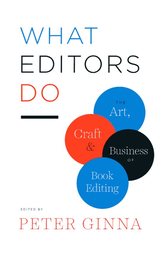A WRITER'S WIT |
My Book World

Craft, and Business of Book Editing.
Chicago: U of Chicago, 2017.
Ginna has amassed a large number of essays by editors and agents, or those who used to be one or the other. He organizes their pieces around broad topics such as acquisition, editing process, and publication. But he also includes a section concerning memoir and one about careers in publishing. Writers have heard ad infinitum what editors want when they attend workshops, but somehow, when one is suddenly on the other side of the desk peering through the eyes of those editors one begins to understand. One begins to change how one might structure one’s book or write a book proposal. One suddenly sees what is important. One sees what editors do not want to see. I found three essays to be particularly helpful to me, but I imagine that each reader of this book may find others more attractive precisely because they have different priorities than I do.
1. “The Other Side of the Desk: What I learned about Editing
When I Became a Literary Agent,” by Susan Rabiner.
“It’s the value added by the author to what is essentially a set of facts, stories, and commentary in search of a larger meaning. To conceptualize is to link these facts, stories, and commentary to a compelling point. A successful book proposal offers to take the reader on a journey. It may be one he has taken, in some form, many times before. An author’s concept for the book is her promise [is] that with the benefit of new research, new stories, new insights, and her authorial guiding vision, the reader will see new things on the journey and arrive at a new destination—and even, at the end, be changed by the experience” (77).
2. “The Half-Open Door: Independent Publishing and
Community,” by Jeff Shotts.
“There is now, as a result, a vast commercial enterprise around book publishing, where annual profits are valued above cultural currency, books are spoken of in terms of ‘units,’ and readers are sorted by algorithm into categories by which they can be told with increasing accuracy just what it is they want. Commercial values have conflated quantity with quality, and commercial publishers are forced to create the appearance of quality, if there is none, in service of quantity. High advances and movie deals make the news, as do celebrity authors and their book parties and television appearances” (142).
3. “Marginalia: On Editing General Nonfiction,” by Matt
Weiland.
“I also remind the reader that clarity is king. ‘There is nothing that requires more precision, and purity of express, than to write in a familiar style,’ as the great English essayist William Hazlitt put it nearly two hundred years ago. ‘To write as anyone would speak in common conversation who had a thorough command and choice of words, or who could discourse with ease, force,and perspicuity. . .’ To me these are the cardinal virtues of strong, convincing English prose. (Hazlitt’s last term, meaning ‘clarity,’ is now, alas, an antique word)” (173).
NEXT TIME: My Journey of States-29 Hawaii



 RSS Feed
RSS Feed